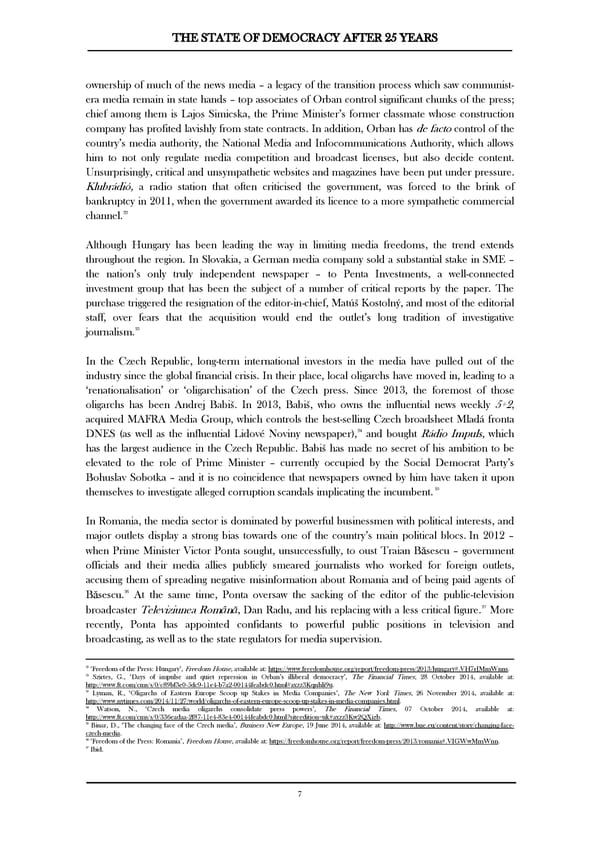THE STATE OF DEMOCRACY AFTER 25 YEARS ownership of much of the news media – a legacy of the transition process which saw communist- era media remain in state hands – top associates of Orban control significant chunks of the press; chief among them is Lajos Simicska, the Prime Minister’s former classmate whose construction company has profited lavishly from state contracts. In addition, Orban has de facto control of the country’s media authority, the National Media and Infocommunications Authority, which allows him to not only regulate media competition and broadcast licenses, but also decide content. Unsurprisingly, critical and unsympathetic websites and magazines have been put under pressure. Klubrádió, a radio station that often criticised the government, was forced to the brink of bankruptcy in 2011, when the government awarded its licence to a more sympathetic commercial channel.22 Although Hungary has been leading the way in limiting media freedoms, the trend extends throughout the region. In Slovakia, a German media company sold a substantial stake in SME – the nation’s only truly independent newspaper – to Penta Investments, a well-connected investment group that has been the subject of a number of critical reports by the paper. The purchase triggered the resignation of the editor-in-chief, Matúš Kostolný, and most of the editorial staff, over fears that the acquisition would end the outlet’s long tradition of investigative 23 journalism. In the Czech Republic, long-term international investors in the media have pulled out of the industry since the global financial crisis. In their place, local oligarchs have moved in, leading to a ‘renationalisation’ or ‘oligarchisation’ of the Czech press. Since 2013, the foremost of those oligarchs has been Andrej Babiš. In 2013, Babiš, who owns the influential news weekly 5+2, acquired MAFRA Media Group, which controls the best-selling Czech broadsheet Mladá fronta 24 DNES (as well as the influential Lidové Noviny newspaper), and bought Rádio Impuls, which has the largest audience in the Czech Republic. Babiš has made no secret of his ambition to be elevated to the role of Prime Minister – currently occupied by the Social Democrat Party’s Bohuslav Sobotka – and it is no coincidence that newspapers owned by him have taken it upon 25 themselves to investigate alleged corruption scandals implicating the incumbent. In Romania, the media sector is dominated by powerful businessmen with political interests, and major outlets display a strong bias towards one of the country’s main political blocs. In 2012 – when Prime Minister Victor Ponta sought, unsuccessfully, to oust Traian Băsescu – government officials and their media allies publicly smeared journalists who worked for foreign outlets, accusing them of spreading negative misinformation about Romania and of being paid agents of 26 Băsescu. At the same time, Ponta oversaw the sacking of the editor of the public-television 27 broadcaster Televiziunea Română, Dan Radu, and his replacing with a less critical figure. More recently, Ponta has appointed confidants to powerful public positions in television and broadcasting, as well as to the state regulators for media supervision. 21 ‘Freedom of the Press: Hungary’, Freedom House, available at: https://www.freedomhouse.org/report/freedom-press/2013/hungary#.VH7rJMmWnns. 22 Szirtes, G., ‘Days of impulse and quiet repression in Orban’s illiberal democracy’, The Financial Times, 28 October 2014, available at: http://www.ft.com/cms/s/0/c89bf3e0-5dc9-11e4-b7a2-00144feabdc0.html#axzz3Kqnhli9u. 23 Lyman, R., ‘Oligarchs of Eastern Europe Scoop up Stakes in Media Companies’, The New York Times, 26 November 2014, available at: http://www.nytimes.com/2014/11/27/world/oligarchs-of-eastern-europe-scoop-up-stakes-in-media-companies.html. 24 Watson, N., ‘Czech media oligarchs consolidate press powers’, The Financial Times, 07 October 2014, available at: http://www.ft.com/cms/s/0/336eadaa-2f87-11e4-83e4-00144feabdc0.html?siteedition=uk#axzz3Kw2QXizb. 25 Binar, D., ‘The changing face of the Czech media’, Business New Europe, 19 June 2014, available at: http://www.bne.eu/content/story/changing-face- czech-media. 26 ‘Freedom of the Press: Romania’, Freedom House, available at: https://freedomhouse.org/report/freedom-press/2013/romania#.VIGWwMmWnn. 27 Ibid. 7
 The State of Democracy After 25 Years Page 7 Page 9
The State of Democracy After 25 Years Page 7 Page 9